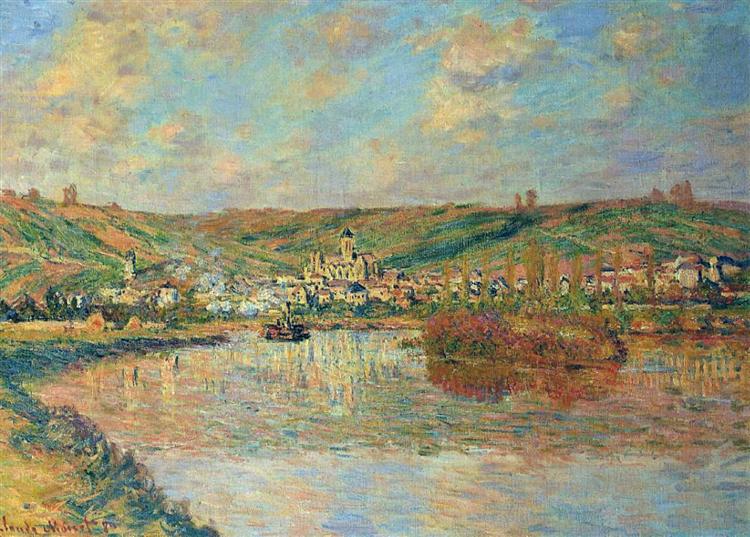Description
Claude Monet's "Evening at Vetheuil", painted in 1880, is a splendid example of the Impressionist style that redefines the capture of light and color through loose brushwork and evocative atmosphere. Monet, a pioneer of Impressionism, employs this technique to depict a specific moment of the afternoon in the village of Vetheuil, where he lived for several years. His choice of this location is not accidental; Vetheuil, on the banks of the Seine, became a place habitually loved by the artist, resulting in a series of works that focus on its landscapes, especially with the river as a central element.
The composition of "Afternoon at Vetheuil" shows us a landscape where multicoloured tones play a fundamental role. Here, the palette is rich in shades of blue, green and gold, which combine nature and light in a chromatic dance. Monet manages to capture the essence of the sunset, where the last rays of the sun intertwine with the reflection in the water, generating an atmosphere of peace and tranquillity. The interpretation of light, especially in the sky and its reflection in the Seine, is subtle and profound, something that only a master of observation could achieve. The areas of the painting have a balance that provokes a feeling of serenity and harmony in the viewer.
Throughout the work, it is notable how Monet integrated natural elements with his dynamic brushwork. Although no human figures are in focus, there is an implicit human presence in the landscape; the small boats anchored on the shore suggest activity and life. In this sense, Monet moves away from the representation of the human figure to focus on the pure landscape, but suggests the existence of man through the intervention of nature in his works. This approach highlights the artist's interest in the interaction between humans and their environment.
An interesting aspect of Afternoon at Vetheuil is how it reflects Monet's emotional stability during a period of his life that, while marked by personal challenges, was also one of artistic flourishing. This period was crucial for Monet, as it solidified his mastery of the Impressionist technique, fueling his ongoing quest for the representation of light and atmosphere in painting. His experimentation with color and form during this time not only defined him as a leader in the Impressionist movement, but also influenced later generations of artists.
The visual characteristics of "Afternoon at Vetheuil" allow the viewer an emotional and sensorial connection with the landscape. The work invites one to appreciate the importance of the moment, highlighting the passage of time and the environmental change that characterizes nature. This awareness of the environment, a hallmark of Monet's works, offers an intimate and personal look at reality, where each brushstroke becomes a reflection of the artist's inner experience.
In conclusion, "Afternoon at Vetheuil" is more than a landscape representation; it is a tribute to the ephemeral beauty of nature and to Monet's ability to convey sensations through color and light. With his firm command of the impressionist technique, Monet offers a work that will be remembered not only for its aesthetics, but also for the emotional bond and introspection it generates in those who observe it. With this work and other similar works, he makes clear his legacy as a master in the articulation of impressionism and his perpetual search to capture the essence of the moment.
KUADROS ©, a famous painting on your wall.
Hand-made oil painting reproductions, with the quality of professional artists and the distinctive seal of KUADROS ©.
Painting reproduction service with satisfaction guarantee. If you are not completely satisfied with the replica of your painting, we will refund 100% of your money.

